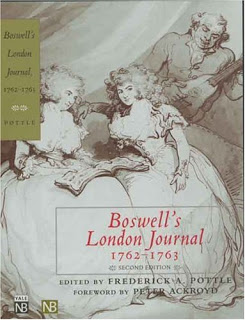
I don’t suppose many people read Boswell, and those who do probably don’t begin with his lesser works. But there you go: such are the perils and pleasures of not letting the Amazon algorithm suggest what you read, but rather the mysterious inner workings of a charity shop at Clapham Junction.
The algorithm rationally assigns you what you would probably enjoy (i.e., the big classic: Boswell’s Life of Johnson). The British Heart Foundation shop erratically suggests the reading preferences of whoever has died that week. This I really quite enjoy, as for some reason this particular charity shop has really rather highbrow donors. It’s surprising. I suspect it is because readers of similar tastes go there, and so donate there, and so go there. It’s me and a bunch of OAPs, would be my guess. So that’s the story of why I am reading a relatively obscure 18th century diary in an even more obscure 1950 edition the cover of which I struggled to find on Google images for your thumbnail enjoyment.
I love a good diary. There is something extraordinarily reassuring in seeing the day-to-day of someone else’s life, even if that someone has been dead for 200 years. Here’s a flavor, from the footnotes:
About this time he (Boswell) began also to write a series of memoranda, one octavo page every day, apparently jotted down the last thing before he went to bed or the first thing in the morning before he put on his clothes. In them he tells himself, always in the second person, what to eat, what to wear, what supplies to get in, what books to read; makes schedules for calls; gives directions for pleasures; orders himself to keep his journal posted; implores himself to try to attain to greater gravity.
It’s touching to see how other people suffer days when they are down, for no reason; that other people have to make resolutions; have to find self-control, and exercise that boring daily discipline of happiness. It’s particularly touching to read the diary of someone in their early twenties, as I don’t think that’s something often preserved (unless they are a suicide). I’m struck by how much time Boswell spends resolving on ‘manner’ – on being this or that type of person. I recall that from my twenties, and it’s interesting to see I don’t seem to do that anymore. Perhaps I am actually an adult.
There’s also a charming and sometimes horrifying flavor of 18th century London. Boswell is always to be found drinking coffee, going to the theatre, eating in chop houses, etc. Here we are with a prostitute (he’s always having sex with these poor women in the street):
In the Strand I picked up a little profligate wretch and gave her sixpence. She allowed me entrance. But the miscreant refused me performance. I was much stronger than her, and volens nolens pushed her up against the wall. She however gave a sudden spring from me; and screaming out, a parcel of more whores and soldiers came to her relief.
I have a lot of questions that I don’t really want answered about all of that. Near the end of his diary Boswell finally meets Johnson, and we see here his first notes that would become the famous Life. It’s enormously quotable, and makes me feel I need to work on polishing my conversational knife a little further:
Sir, I was once a greater arguer for the advantages of poverty, but I was at the same time very discontented. Sir, the great deal of arguing which we hear to represent poverty as no evil shows it to be evidently a great one. You never knew people laboring to convince you that you might live very happily upon a plentiful fortune.
And:
Mr Johnson said today that a woman’s preaching was like a dog’s walking on his hinder legs. It was not done well, but you were surprised to find it done at all.
Also charming are the editor’s almost insanely detailed, and sweetly dated, footnotes, which clearly mark how much this academic loves this man. Example – Boswell is busy with another prostitute, and the editor comments: “ ‘roger’ of course has a different meaning today, in this age of radio-telephony”
I love that line of Alan Bennett’s about reading being “as if a hand has come out and taken yours” from across time. This book made me feel like that, in the best possible way.
